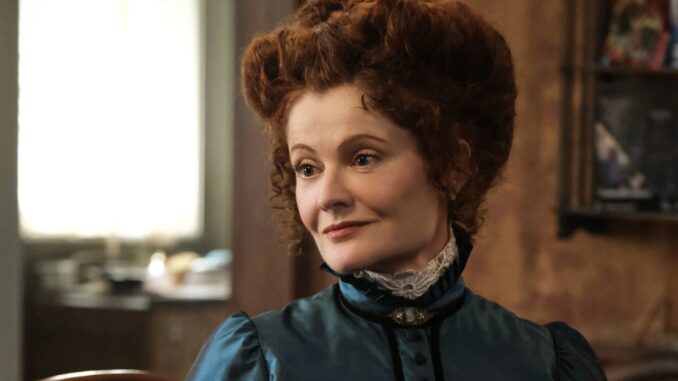
Emerald Threads and Spectral Gifts: Rebecca Wisocky Unearths Hetty's Heart
The very premise of CBS’s Ghosts is a delightful paradox: the spectral residents of Woodstone Mansion are perpetually stuck in the past, yet intimately intertwined with the present, observing and influencing the lives of their living hosts. It’s a show where history, humor, and heart coalesce, and at its formidable core stands Hetty Woodstone, the ancestral matriarch, brought to formidable life by the inimitable Rebecca Wisocky. When Wisocky speaks about Hetty’s St. Patrick’s Day gift and the celebration of Irish heritage, it’s not merely a throwaway anecdote; it’s a luminous thread connecting the show’s comedic brilliance to its deeper explorations of legacy, identity, and the surprising humanity that transcends even death.
Hetty Woodstone is, by all accounts, a stern sentinel of a bygone era. A woman of privilege and rigid Victorian sensibilities, she often projects an image of unwavering propriety and barely concealed disdain for the modern world. Yet, the magic of Wisocky’s portrayal lies in the subtle cracks she allows to show in Hetty’s formidable facade. To imagine Hetty, the embodiment of American old money and inherited expectations, engaging with a holiday like St. Patrick’s Day – a celebration often associated with immigrant resilience and vibrant, sometimes boisterous, traditions – immediately piques curiosity. What sort of "gift" could such a character bestow, especially from the afterlife?
Wisocky, with her nuanced understanding of Hetty, reveals that the "gift" isn't a material object, but something far more profound: a moment of connection, a subtle unveiling of the layers beneath Hetty’s stiff exterior. It’s a testament to the show’s writing and Wisocky’s craft that such a moment can carry significant weight. Perhaps Hetty’s gift is a piece of forgotten wisdom, a previously unknown anecdote from her vast repository of history, or even a fleeting moment of unexpected vulnerability. It’s a spectral offering, one that speaks less to monetary value and more to the invaluable currency of understanding and shared humanity. In this context, the gift becomes a symbol of Hetty’s own slow, almost imperceptible evolution, a softening of her rigid edges as she begrudgingly accepts the interconnectedness of her eternal existence.
Beyond the individual gesture, Wisocky’s discussion naturally broadens to the broader theme of celebrating Irish heritage. St. Patrick’s Day is more than just green beer and shamrocks; it’s a powerful commemoration of resilience, migration, storytelling, and a deep-rooted cultural identity. While Hetty herself might not be Irish, her existence as an ancestor, a living (or rather, ghostly) link to the past, makes her a potent symbol for the concept of heritage itself. Every ghost in Woodstone Mansion represents a slice of history, a lived experience that has shaped the present. In this sense, Hetty embodies the very idea of inheritance – not just of land, but of stories, traditions, and the collective memory of a people.
Wisocky's insights illuminate how the show, through its diverse cast of characters, indirectly celebrates the tapestry of different heritages that make up America. From Viking to Lenape, Prohibition-era lounge singer to 1990s scout leader, each ghost brings a unique cultural imprint. Hetty, the great-great-great-grandmother, is a vessel for American history, and her engagement, however begrudging, with a holiday honoring Irish heritage bridges cultural gaps within the mansion. It suggests that even in the afterlife, identities are not static, and the spirit of connection and recognition can transcend the boundaries of individual experience and even historical animosity.
Ultimately, Rebecca Wisocky’s reflection on Hetty's St. Patrick's Day gift and the celebration of Irish heritage is an illustrative microcosm of Ghosts' larger appeal. It demonstrates how a seemingly simple holiday plot point can unfurl into a rich exploration of character depth, cultural significance, and the enduring human (or ghostly) need for connection. It reminds us that heritage, whether Irish or otherwise, is a living thing, a story passed down through generations, and sometimes, even through the spectral whispers of those who came before. In Hetty's subtle offering, we find not just a comedic beat, but a profound illustration of the heart that beats within the spectral halls of Woodstone.